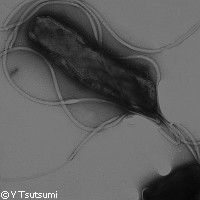EU-funded research unravels link between Helicobacter pylori and stomach cancer
EU-funded researchers in Denmark, France and Portugal have shed new light on how the bacterium Helicobacter pylori causes stomach cancer. They found that the bacterium, which infects about half the world's population, contributes to the onset of stomach cancer by impairing DNA repair mechanisms. The results are an outcome of the INCA ('The role of chronic infections in the development of cancer') project, which was financed with EUR 12.4 million under the Life sciences, genomics and biotechnology for health Thematic area of the Sixth Framework Programme (FP6). Previous studies of H. pylori have shown that in a small number of infected patients, complex interactions between the bacteria and the host lead to the development of stomach cancer. Recent data have suggested that H. pylori infection either causes DNA damage and mutation, or that it inhibits DNA repair. In this most recent study of H. pylori and stomach cancer, the team analysed major DNA repair activities in human gastric cells and in mice that were infected with a particularly virulent strain of H. pylori. Their results, published in the journal Clinical Cancer Research, were supported by similar results seen in biopsies from H. pylori-infected patients with chronic gastritis. 'Although a causal relationship exists between H. pylori infection and the development of gastric carcinoma,' the authors write, 'the molecular mechanisms underlying this observation have remained elusive. Because impairment of genomic integrity often leads to carcinogenesis, we focused on the response of the host DNA repair pathways to H. pylori infection.' The researchers discovered that H. pylori-induced cancer results from a combination of at least three linked phenomena: an increase in reactive oxygen species (which leads to oxidative stress) and a decrease in repair activity; mutations in mitochondrial DNA (DNA in the mitochondria, the part of the cell that creates energy); and the existence of transient mutators which, if unrepaired, may generate mutations and lead to malignancy. Another finding was that increasing virulence of H. pylori was related to the number of mutations seen in the mitochondria of gastric cells. They also observed that in mice, the number of mutations owing to mismatch repair or MMR (a system for repairing incorrect insertion or deletion during DNA replication and recombination) were abnormally high after 6 months of infection, but not after 12 months. The timing suggests a temporary effect of H. pylori on MMR, but the number of mutations indicates a higher risk for a mutation to evade repair and lead to malignancy. The authors suggest that intervention is likely to be most effective at the early stages of infection, and that efforts to treat H. pylori at later stages are unlikely to impact the likelihood of a patient developing cancer. Stomach cancer is currently the fourth most common cancer and the second cause of cancer death worldwide. It has a very poor prognosis: fewer than 20% of patients survive longer than 5 years. H. pylori infection is only one of several factors that can lead to gastric carcinoma; others include environmental factors such as smoking and diet (most notably salt and nitrate, which can cause DNA damage). 'Patients with Helicobacter pylori are at increased risk of gastric cancer,' the authors write. The study clarifies some important molecular mechanisms that underlie the relationship between H. pylori infection and the development of stomach cancer.
Countries
Denmark, France, Portugal



